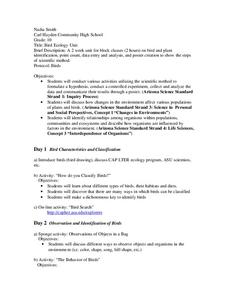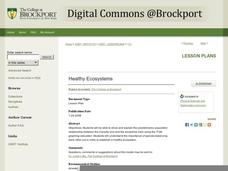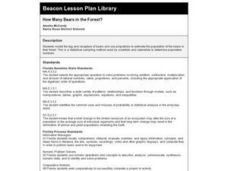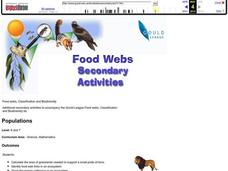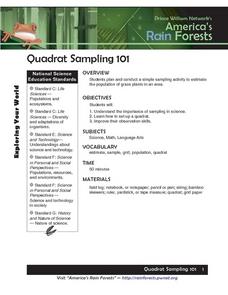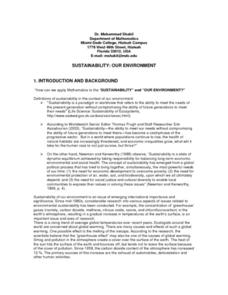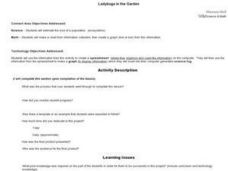Howard Hughes Medical Institute
Population Dynamics
Will human population growth always be exponential, or will we find a limiting factor we can't avoid? Young scientists learn about both exponential and logistic growth models in various animal populations. They use case studies to...
Curated OER
Bird Ecology Unit
Tenth graders conduct various activities utilizing the scientific method to formulate a hypothesis, conduct a controlled experiment, collect and analyze the data and communicate their results through a poster. They also identify...
College at Brockport
Healthy Ecosystems
Is there a connection between the snowshoe hare population and the lynx population? Young scientists will examine this question and graph actual data to determine the relationship between these two species, as well as researching another...
Shodor Education Foundation
Rabbits and Wolves
A change in a parameter can end in overpopulation. The resources gives pupils the opportunity to control the parameters of rabbits and wolves in a natural setting. Using the set parameters, the simulation runs and displays the population...
Curated OER
How Many Animals?
Students use their math skills to develop estimates for the population of several animal species native to the Austrailian rainforest. It is a simulation that researchers at the Center for Rainforest Studies in Australia perform to...
Curated OER
Oh Deer! and English Learner Writing Extensions
Students follow deer through Yellowstone Park and record the number of deer from year to year. In this basic needs of deer lesson, students work in small groups and chart the number of deer each year and give explanations using as...
Curated OER
Exploration of "Pillbugs"
Fifth graders define vocabulary terms, identify the characteristics of a pillbug, and create a dichotomous key. Then they examine the pillbugs and make observations and record these observations. Finally, 5th graders observe specific...
Curated OER
Carrying Capacity of Ecosystems
Students define population and carrying. In this algebra lesson, students explore exponential growth and decay based on animals and things that grow or decrease exponentially. They graph their findings and discuss their results as they...
National Wildlife Federation
Gator Hole Graphics
Climate changes are cyclic so how do these changes impact species that live in different habitats? Learners examine the rainfall levels in a specific swamp habitat. They also review graphical data and tell a story about how the...
Curated OER
Mark-and-Recapture
Pupils investigate the mark-and-recapture method for estimating the population of an animal species. They evaluate given data to answer a set of questions.
Curated OER
The Coyote Population: Kansas Prairies
Students discover animal lifestyles by researching their ecosystem. In this animal statistics lesson, students research the geography of Kansas and discuss the reasons why wild animals survive in the open Kansas fields. Students complete...
Curated OER
Biomimicry, Nature: Architecture of the Future
Students explore the relationship between nature and architecture. In this cross curriculum history, culture, and architecture lesson, students observe and discuss structures visible in nature. Students view websites in which Native...
Curated OER
How Many Bears in the Forest?
Third graders model the tag and recapture of bears and use proportions to estimate the population of the bears in their forest. This is a statistical sampling method used by scientists and naturalists to determine population numbers.
Curated OER
Chesapeake Bay Population Studies
Pupils determine how to use a quarter meter quadrant to find population density, relative density, frequency and how to calculate a diversity index while participating in a virtual field trip. They study how to establish a Correlation of...
Curated OER
Populations
Students calculate the area of grasslands needed to support a small pride of lions. They also identify food web links in an ecosystem and trace the energy pathways in an ecosystem.
Curated OER
Bird airport control
Learners identify the various species of birds found in the wetlands. Students observe and record the key skills involved in scientific inquiry. Learners handle and interpret data gathered on a field trip which reveals patterns and...
Curated OER
How Many Penguins Does It Take? Studying Carrying Capacity and Limiting Factors
How does a population's habitat determine the size of that population? Teach learners about carrying capacity and limiting factors with an engaging roleplay activity. Class members pose as a colony of penguins who must gather food amidst...
Howard Hughes Medical Institute
Measuring Biodiversity in Gorongosa
Take your biology class' understanding of biodiversity to a whole new level! Ecology scholars use data to calculate three different diversity indices based on the organisms in the Gorongosa National Park. The four-part activity uses an...
Curated OER
Quadrat Sampling 101
Students explore the population of grass plants in a given area. They plan and conduct a sampling activity to estimate the population of dandelions or the number of grass blades on the school grounds.
Curated OER
Wildlife Sampling-Capture-Recapture
Seventh graders simulate the capture-recapture method of population sampling using beans. In this biology instructional activity, 7th graders calculate the total population of beans in the bowl. They assess whether this method is...
Curated OER
Sustainability: Our Environment
Pupils explore the sustainability of our environment, the trend in rising temperatures and the emission of greenhouse cases. Using given data, students test and construct a confidence interval and the difference between two population...
Curated OER
Investigating comparative biodiversity of wetland and schoolyard sites
Fourth graders participate in an activity dealing with the environment.
Curated OER
Ladybugs in the Garden
Fifth graders estimate the size a population (ecosystems) Students make a chart from information collected then create a graph (line or bar) from this information. Students do a lesson where they observed, examine, and record data...
Curated OER
Community Tree Contest
Students observe trees in their neighborhood. They practice tree identification and incorporate math skills to determine the winner of a 'Tree-mendous Tree' contest in which they determine which is the biggest tree.

